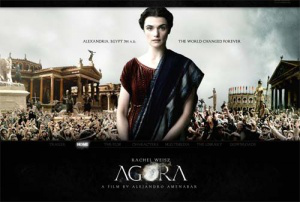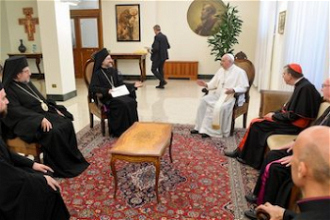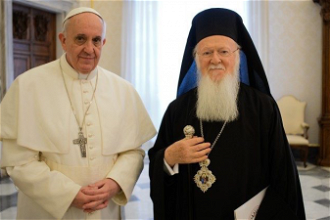Film: Agora

Hypatia was a woman philosopher, astronomer, and mathematician, who lived in 4th century Christian Alexandria. Her story is told in Agora, an unusual new film directed by Alejandro Almanebar. Fr Peter Malone from Signis has issued the following analysis.
While not a film which will draw large audiences, as it is quite demanding in its content and dialogue, Agora will certainly appeal to those who are interested a period of Christian history not well known these days.
Some reviewers who have seen the film suggest that there is a need for some historical background, especially about the Church in Egypt, in the city of Alexandria, at the end of the 4th century and the beginning of the 5th century. But, first some words about the overall impact of the film itself.
Impressive to look at, the film is a combination of sets and computer generated locations. It was shot in Malta (with a fair percentage of the population seeming to be present as extras, lots of crowd scenes).
The central character is the renowned pagan philosopher, Hypatia, played with some authority by Rachel Weisz. Her philosopher father, Theon, is played by the French actor, Michel Lonsdale. Several sections of the film, some lengthy, are classes and discussions about the nature of the universe and speculation on the Ptolemaic theories of the relationship of the earth to the sun and the planets and how the stars move - or does the sun, or does the earth? Audiences who are not strong on astronomy or geometry may find these sequences too difficult, even baffling. But, it is quite a daring thing to present a feature film which raises these issues and asks its audience to think about them.
However, it is the religious background of the film which needs some explaining. By and large, the screenplay is accurate enough, especially about Hypatia, Orestes the governor of Alexandria and Sinesius, bishop of Cyrene, a pupil of Hypatia, who demands an assent of faith from her at the end of the film but who actually wrote in defence of her theories and died before her murder. There are problems with the presentation of Cyril of Alexandria, bishop of the city, later declared a saint and an important doctor of the church with his contributions to the theology of the humanity and divinity of Jesus.
The film might have been more satisfying for those who know something of the period had it alerted the audience to the fact that relations between pagans, Christians and Jews were not quite as straightforward as they are presented here. While it is accurate enough in general, there is much more to the feuds, hostilities, persecutions and massacres.
The 4th century was one of the most difficult in the Church's history and the source of much of the difficulty was, in fact, Alexandria.
From the 2nd century AD, the centres of intellectual debate and theological argument were in the schools of Alexandria and Antioch. By 300 AD, there were great developments in sophisticated theological thought in Alexandria. Agora does not really reflect this reality of the Alexandrian Christians. We see the Christians reflecting on the Scriptures (the Beatitudes in particular), the bishop preaching to the faithful and, later, the reading of texts from Pauline letters which are restrictive on the activities of women in the Church. But - and this may have been the case - most of the Christians are not well educated and easily swayed by populist demagogues, one of whom challenges the pagans to walk through fire unharmed as he does. He is seen as a miracle worker - the dared pagan goes up in flames. However, this is balanced by the same man showing a convert slave the ordinary miraculous in supplying bread for distribution to the poor. Reasonable enough and a fairly sympathetic view of Christians.
But, what had been most important in Alexandria at the beginning of the century was the teaching of the local priest, Arius, whose understanding of the relationship between the Father and the Son emphasised the humanity of Jesus as somehow making him inferior to the divine Father. His opponent was the bishop of Alexandria, St Athanasius, who found himself exiled from his city more than once. The historical complication was that this was the time when the emperor Constantine declared that Christianity not be a banned religion, 312 AD. Clashes, both ideological and physical, between pagans and Christians, spread throughout the empire as did the response of governors to the new situation, some for, some against.
While the Church resolved the Christ issue at the first of the ecumenical (worldwide) councils in Nicaea, a suburb of Constantinople, in 325, and enshrined it in a creed formulation that is still recited on Sundays at Masses around the world, the followers of Arius, maintained their stances and influenced a number of political rulers who used their adherence to Arianism to combat bishops. This would have been the case at the time of Hypatia. This could have been incorporated into some of the discussions in the film which would have heightened the reality of the persecution of the Christians by the pagans which resulted in fanatical and violent response, massacres in revenge for the killing of Christians and vandalism in destruction of the world's greatest library.
Hypatia, declaring herself a seeker after truth and an investigator of the universe, escaped the attacks and survived.
Further councils in 431 (Ephesus) and 451 (Chalcedon in Constantinople) led to further work on the theology of the humanity and divinity of Christ.
The second half of the film takes place in 415, the year of Hypatia's death. The bishop of Alexandria is Cyril. Checking Google references for him shows that he was as irascible as portrayed in the film. He fomented clashes with Orestes who had become a Christian as had many of the pagans and rulers. Another of his targets was the Jewish community. There is a similar difficulty in the portrayal of the Jews as stone throwing zealots and then victims, though not as viciously fanatic as some of the Christian zealots, especially a group of monks who patrol the city supervising morality.
There are records of Jews being in Alexandria since the early 6th century BC, the prophet Jeremiah and others fleeing there after the destruction of Jerusalem and the Temple in 587. Much intellectual reflection on the Jewish scriptures and the translation of books from Hebrew to Greek were done in Alexandria. The book of Wisdom, accepted in the Catholic biblical canon comes from this city in the 1st century BC. It is said that John's Gospel was influenced by the Alexandrian philosopher, Philo. Which means that at the time of the Jewish-Christian clashes in the film, Jews had been a significant part of Alexandria and its intellectual life for about a thousand years.
An Egyptian historian, Damascius, claimed that Cyril was responsible for the death of Hypatia and her very cruel martyrdom. Agora's screenplay follows this. Historians say there is no other evidence that this is exact - some 19th century authors took it up again. However, historians do say that Cyril's bitter approach fomented the pervading atmosphere of hostility which led to Hypatia's death.
So, there is much in Agora for audiences interested in films which dramatise unfamiliar periods of history. And, it may be more accurate than many others. The above background might have been incorporated into the screenplay to make it more solid and nuanced.
Hypatia the martyr
While initially the pagans are shown as clinging to their gods and to their own civil status and initiating persecution of the Christians, the Christian response (which was regrettably repeated down the ages, think St Bartholomew's Day massacre of 1572 against the Huguenots) is rabble-roused fanaticism. With the Jewish-Christian clashes, there is a huge heritage of history and persecution which puts the sad experience of the 20th century in the audience's mind.
At the end, Hypatia is presented as a martyr and quite movingly declaring her own integrity (rather than faith) and bravely and heroically facing her death. This is strongly reminiscent of, even parallel to, the way that the Christian martyrs were portrayed in the storytelling of the early church.
[Actually, there was much more vitality and sophistication in the Christian churches of this period. St Ambrose was bishop of Milan at this time and St Augustine repented of his past in 397 and became the leading theologian of the western church. When Hypatia died, he was bishop of Hippo further west from Alexandria in north Africa, not all that far from the film' real character, Sinesius, bishop of Cyrene. By the middle of the 5th century Attila the Hun was at the gates of Rome, barbarians at the borders and the western empire was on the verge of collapse.]
Amenabar himself says that the film is not against Christianity but 'a film against fundamentalism, against those who defend their ideas with weapons. It is not against Christians and most certainly not against the Christians of today'.


















